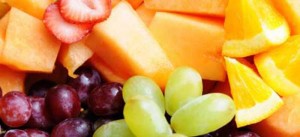Good nutrition is needed to speed healing and give you needed energy. Keep up the same good eating habits you developed while you were pregnant. Eat foods high in protein, vitamin C, and iron. Protein helps the healing process and is needed for the growth of new tissue. Vitamin C plays an important role in healing and fighting infection. Iron helps the immune system and is needed for hemoglobin. Your body loses iron when it loses blood.
A food is high in protein, vitamin C, or iron if you meet at least 20% of your daily needs by eating one serving of that food. Reading the nutrition facts on food labels will help you learn which foods are high in protein, vitamin C, and iron. Foods high in protein are meats, fish, chicken, eggs, dairy foods, nuts, dried beans, and peas. Foods high in vitamin C are oranges, grapefruits, strawberries, melons, and papayas. Foods high in iron are red meats, liver, dried beans, dried fruits, and iron enriched cereals.
It is important to drink plenty of fluids. Drinking fluids helps prevent dehydration and constipation. Drink 8 to 10 eight-ounce glasses of fluids each day, including low-fat milk, nonsweetened fruit juices, and especially water. If you’re breastfeeding include at least 4 glasses of low-fat milk or calcium fortified juice or eat low-fat yogurt to get enough calcium and to increase your milk supply.
If you are breastfeeding. Drinking extra fluid is important if you are breast-feeding. Drink 8 to 12 eight-ounce glasses of fluids each day, especially juice, low-fat milk, water, and soup. Nursing can make you thirsty so keep a big glass of water nearby. Add 500 extra calories to the diet you would normally eat every day if you were not pregnant. Or, add 200 calories to your pregnancy diet. Extra calories and fluids are needed for making high quality milk. You can add the extra calories by drinking extra fruit juices and low-fat milk. Also, make an effort to include foods rich in Vitamin A such as greens, cantaloupes, carrots, and sweet potatoes.
Vitamins And Iron Supplements
Your doctor may want you to keep taking your prenatal vitamins and iron pills for the first 6 weeks. Iron can upset your stomach if you take more than one iron pill at a time. It takes about 6 months for your body to restore its supply of iron. If you are bottle feeding your newborn, you can take an over-the- counter vitamin with iron for 6 months. If you are breastfeeding, your doctor may have you take prenatal vitamins for as long as you breast-feed.
Bowel Movements
It is normal to fear that straining during a bowel movement will cause pain from your stitches or hemorrhoids. You can make bowel movements easier by drinking plenty of fluids and eating plenty of fiber. Eat more servings of fresh fruits, vegetables, and bran cereals or breads that are high in roughage. Foods high in roughage stimulate normal bowel movements. Walking also speeds the return of normal bowel and bladder function.
Constipation is not uncommon and can result from hemorrhoids, perineal swelling, fear of having a bowel movement, or as a side effect of some medicines (narcotics). Also, the loss of muscle tone in your abdomen can make it harder for you to move your bowels. If you have problems with constipation or moving your bowels, or you do not have a bowel movement by the 3rd day, call your doctor. Your doctor may order a stool softener, an enema, or a suppository. Avoid laxatives that make your stool very loose or watery. Loose stool can get onto your stitches more easily than soft stool. Also, stool can irritate the skin.
Getting a little exercise like walking can also help with constipation.
Weight Loss
New mothers on TV get their figure back right away. In real life it takes awhile longer! A good rule of thumb is “9 months up, 9 months down.” You will lose about 12-13 pounds with your baby’s birth and another 5 pounds from normal fluid loss by the 5th day. Weight loss usually levels off after the first 6 weeks, when you should be back to your normal weight. Breastfeeding mothers usually lose weight more quickly than non-nursing mothers.
Because nutrition is so important for healing, your doctor may want you to wait until after your postpartum check-up to begin a weight loss diet. Avoid adding unwanted weight while your activity level is low. Avoid junk foods or foods high in calories and low in nutritional value. Crash diets or pills that promise quick weight loss are unhealthy for you and your baby if you are nursing. However, it is OK to reduce the amount of fat in your diet. A regular routine of continuous moderate exercise for a half-hour each day is the safest way to lose weight.
More about Self Care After Vaginal Birth
Introduction to Self-care After Vaginal Birth
Preventive Self Care
Perineal Care
Physical Changes and Healing
Breast Care
Activities and Healthy Exercise
Nutrition and Diet
Family Planning and Birth Control
Normal “Baby Blues” or Postpartum Depression
Your Postpartum Check-Up
Get as Much Rest as You Can
When to Call Your Doctor

TIP 10
Some quick, nutritious foods and snacks are:
• bagel with cream cheese
• bean burrito
• cottage cheese and fruit
• flavored yogurt
• fresh fruit or fruit juice
• grilled chicken sandwich
• peanut butter sandwich
• vegetable pizza